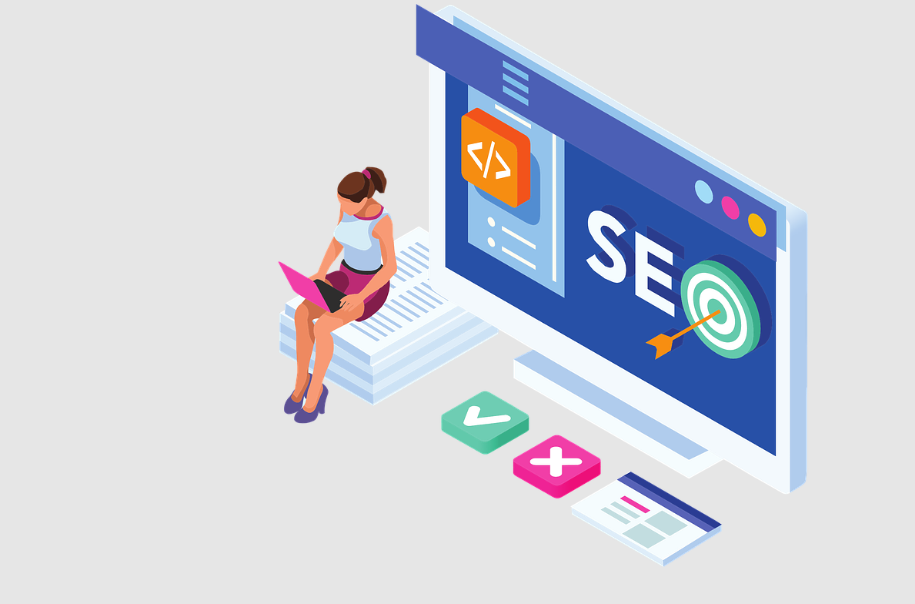Are you ready to harness the potential of ChatGPT for your SEO endeavors? But beware, there’s a trap you must avoid! In this article, I’ll guide you through practical tips to create top-notch content while steering clear of the pitfalls that come with using ChatGPT.
Are you a busy SEO content writer, a savvy SEO professional, or a digital marketing guru? Then listen up! ChatGPT is the game-changer you’ve been waiting for.
Did you know that ChatGPT can sometimes provide inaccurate information? It’s true! According to shocking statistics, relying solely on its responses can lead you astray. But fear not, we’ll show you how to fact-check, verify, and use your common sense to make the most of this powerful tool.
Don’t miss out on this insightful journey into using ChatGPT effectively for SEO success!
Unlocking the Power of ChatGPT for SEO In 2024
Using ChatGPT in SEO Marketing

ChatGPT has made its mark in the marketing industry, despite some challenges along the way. Its arrival has opened up a world of possibilities for marketers, offering a range of valuable use cases in content optimization, generation, and consumer insight gathering and analysis.
When it comes to SEO, the art of attracting users and achieving high organic search rankings, ChatGPT proves to be an indispensable tool.
In fact, it can assist marketers in more than a dozen different ways, revolutionizing their SEO marketing strategies. Here, we present 15 impactful ways to leverage ChatGPT for maximum SEO success.
1. Keyword Research:

Keyword research plays a crucial role in SEO, as it helps identify the right keywords and phrases to target in your content. ChatGPT can be a valuable tool in this process by providing insights, suggestions, and generating relevant keyword ideas.
When using ChatGPT for keyword research, you can input a seed keyword or a general topic and ask for related keywords or specific keyword suggestions. The model can generate a list of potential keywords that you can further analyze and incorporate into your content strategy.
For example, if you’re in the fitness industry and want to optimize your content for “healthy recipes,” you can ask ChatGPT for keyword suggestions related to this topic. It may generate keywords like “quick healthy recipes,” “low-carb recipes,” “gluten-free meals,” or “healthy dinner ideas.” These suggestions can help you expand your keyword list and target specific niches within your industry.
Additionally, ChatGPT can assist in long-tail keyword research. Long-tail keywords are more specific and have less competition, allowing you to target a more focused audience.
For instance, if you’re running a travel blog and want to target a specific destination, you can ask ChatGPT for long-tail keyword ideas related to “best places to visit in Bali.”
It might generate keywords like “hidden gems in Bali,” “beachfront resorts in Bali,” or “budget-friendly activities in Bali.”
By leveraging ChatGPT’s capabilities for keyword research, you can uncover valuable keywords and phrases that align with your content goals and audience preferences.
Remember to analyze the generated keywords, consider search volume and competition, and incorporate them strategically throughout your content to improve your search rankings and attract relevant organic traffic.
2. Content Generation:
Content generation can be a time-consuming task, but with the assistance of ChatGPT, you can streamline the process and create high-quality and engaging content more efficiently. ChatGPT can provide valuable insights, ideas, and even help with structuring your content.
To use ChatGPT for content generation, you can provide the model with a specific topic or outline and ask it to generate relevant content based on that. It can assist in brainstorming ideas, expanding on key points, or even creating entire paragraphs or sections of text.
For example, if you’re writing a blog post about “digital marketing strategies,” you can ask ChatGPT to provide insights on effective strategies or request it to generate a paragraph describing the importance of social media marketing in digital campaigns. It can help you with statistics, examples, and persuasive arguments to strengthen your content.
ChatGPT can also help in creating engaging introductions or catchy headlines. If you’re struggling to come up with a captivating headline for your article on “healthy eating habits,” you can ask ChatGPT for suggestions.
It might generate options like “10 Simple Tips for a Healthier Lifestyle” or “Unlock the Secrets to Nourishing Your Body.”
Remember, while ChatGPT can assist in content generation, it’s important to review and refine the output.
The model’s responses should be used as a starting point or source of inspiration, and human judgment is still crucial to ensure the final content aligns with your brand, audience, and goals.
3. On-Page Optimization:
ChatGPT can be a helpful tool for on-page optimization by providing insights and suggestions to improve meta tags, headings, and other on-page elements that contribute to better search visibility. Here’s how ChatGPT can assist you:
4. Meta Tag Optimization:
You can ask ChatGPT to provide recommendations for optimizing meta tags, including the meta title and meta description. For instance, you can inquire about the ideal length, relevant keywords, and compelling language to make your meta tags more enticing for search engine users.
ChatGPT can generate suggestions like “Craft a concise meta title using targeted keywords to boost click-through rates” or “Write a compelling meta description that summarizes the content and entices users to click.”
5. Heading Structure:
ChatGPT can help you determine an effective heading structure for your webpages. You can ask for advice on the appropriate use of H1, H2, and other heading tags to enhance readability and keyword optimization.
For example, you might ask ChatGPT, “How can I structure my headings to improve SEO?”
It may respond with tips such as “Use H1 for the main title and incorporate relevant keywords, while utilizing H2 and H3 tags to organize subheadings and improve content hierarchy.”
6. Content Formatting:
ChatGPT can provide insights on how to format your content to make it more SEO-friendly. You can ask for recommendations on using bullet points, bolding key phrases, or incorporating relevant internal links.
For instance, you can ask, “How can I optimize my content formatting for better search visibility?” ChatGPT may suggest, “Utilize bullet points to present information concisely, use bold formatting for important keywords, and include relevant internal links to enhance user experience and SEO.”
7. Content Expansion:

ChatGPT can be a valuable tool for SEO professionals when it comes to content expansion. With its vast knowledge base and natural language processing capabilities, ChatGPT can help in adding depth and relevant information to existing content, making it more comprehensive and valuable for readers.
For example, let’s say you have a blog post about “SEO best practices for improving website rankings.”
By using ChatGPT, you can expand on the topic by incorporating additional tips and insights gathered from its extensive training on SEO-related content.
You can ask specific questions about different aspects of SEO, such as on-page optimization, link building strategies, or keyword research. ChatGPT will provide detailed answers and suggestions that you can include in your content to enhance its value.
Furthermore, ChatGPT can assist in exploring related subtopics and providing supporting information to make your content more authoritative and comprehensive.
You can ask about the latest SEO trends, case studies, industry statistics, or even seek advice on common challenges faced by SEO professionals. By incorporating these insights, you can provide a well-rounded and up-to-date resource for your readers.
Using ChatGPT for content expansion not only saves time but also ensures that your content remains relevant and valuable in an ever-evolving SEO landscape.
It helps you go beyond surface-level information and delve into more detailed and nuanced discussions, making your content a go-to resource for readers seeking comprehensive SEO knowledge.
8. SEO Audit:

ChatGPT can be a valuable tool for SEO professionals when it comes to conducting SEO audits and identifying areas of improvement for a website’s SEO performance.
By leveraging the knowledge and capabilities of ChatGPT, SEO professionals can gain valuable insights and guidance to enhance their SEO strategies.
One way ChatGPT can assist in SEO audits is by providing guidance on on-page optimization. SEO professionals can ask specific questions about optimizing title tags, meta descriptions, heading tags, keyword usage, and other on-page elements.
ChatGPT can provide recommendations based on best practices and current SEO trends, helping professionals identify areas where improvements can be made.
ChatGPT can also help in analyzing website structure and user experience. SEO professionals can ask about site navigation, internal linking strategies, mobile optimization, page load speed, and other factors that contribute to a positive user experience.
By receiving insights from ChatGPT, professionals can uncover potential issues and make necessary adjustments to enhance the website’s SEO performance.
Furthermore, ChatGPT can assist in conducting keyword research and analysis. SEO professionals can seek advice on identifying relevant keywords, analyzing search volume and competition, and optimizing content around targeted keywords.
ChatGPT can provide suggestions and insights to help professionals optimize their keyword strategy and improve organic search visibility.
For example, an SEO professional conducting an audit may ask ChatGPT, “How can I optimize my website’s on-page elements for better SEO performance?”
In response, ChatGPT can provide a detailed breakdown of on-page optimization techniques, including tips on optimizing title tags, meta descriptions, and heading tags, along with relevant examples.
9. Competitor Analysis:

ChatGPT can be a valuable asset for SEO professionals when it comes to gaining insights into competitors’ strategies and identifying opportunities.
With its vast knowledge base and analytical capabilities, ChatGPT can provide valuable guidance and suggestions to help professionals stay ahead of the competition.
One way ChatGPT can assist is by analyzing competitors’ websites and providing insights into their SEO strategies.
SEO professionals can ask specific questions about competitors’ on-page optimization, backlink profiles, content strategies, and overall website performance.
ChatGPT can provide valuable insights and recommendations based on its understanding of SEO best practices and industry trends.
For example, an SEO professional may ask ChatGPT, “What are the key elements of my competitor’s SEO strategy?” In response, ChatGPT can analyze the competitor’s website, identify their targeted keywords, evaluate their backlink profile, and provide insights into their content strategy.
This information can help professionals gain a better understanding of their competitors’ tactics and identify areas where they can improve their own strategies.
For instance, an SEO professional may inquire, “Are there any emerging keywords or topics in my industry that I should focus on?” ChatGPT can analyze current trends, identify rising keywords or topics, and provide recommendations for creating relevant content that aligns with these emerging opportunities.
10. Backlink Research:
Utilize ChatGPT to discover authoritative websites for potential link-building opportunities.
For example, you can ask ChatGPT to identify industry-specific websites with high domain authority that could potentially provide valuable backlinks to your website. This can help improve your website’s authority and search engine rankings.
11. Local SEO:
Leverage ChatGPT to optimize your website and content for local search queries. You can ask for guidance on optimizing your website for location-based keywords or improving your local business listings on platforms like Google My Business.
ChatGPT can provide insights into local SEO best practices and strategies to help you increase your visibility in local search results.
12. Voice Search Optimization:
Adapt your content to meet the demands of voice search queries with the help of ChatGPT. You can inquire about voice search optimization techniques and receive recommendations on how to structure your content to better align with voice search queries.
For instance, you can ask ChatGPT for tips on optimizing your content for long-tail conversational keywords that are commonly used in voice searches.
13. SEO Performance Tracking:

Monitor and measure the effectiveness of your SEO efforts using ChatGPT. You can ask for guidance on tracking key performance metrics such as organic traffic, keyword rankings, and conversion rates.
ChatGPT can provide insights on tools and methodologies to track your SEO performance, helping you evaluate the impact of your optimization strategies and make data-driven decisions.
14. FAQ Optimization:
Create informative and SEO-friendly answers to common user queries by leveraging ChatGPT. You can ask ChatGPT to help you optimize your FAQ page by suggesting relevant questions, structuring your answers for better search visibility, and incorporating relevant keywords.
This can enhance your website’s visibility in search results and provide valuable information to your audience.
15. Content Repurposing:
Repackage and repurpose existing content for broader reach and visibility with the assistance of ChatGPT. You can ask for guidance on repurposing content into different formats such as videos, infographics, or podcasts.
ChatGPT can provide creative ideas and suggestions to help you maximize the impact of your content across various platforms and engage with a wider audience.
16. SEO Strategy Development:
Get strategic guidance and recommendations for your overall SEO approach from ChatGPT. You can ask for advice on developing an effective SEO strategy tailored to your specific industry and target audience.
ChatGPT can provide insights on keyword research, competitor analysis, and content planning, helping you create a well-rounded SEO strategy to drive organic traffic and improve search engine rankings.
Quick Links
Conclusion: Unlocking the Power of ChatGPT for SEO 2024
In summary, by utilizing ChatGPT, SEO professionals can gain valuable insights, recommendations, and guidance across various aspects of SEO, including backlink research, local SEO, voice search optimization, performance tracking, FAQ optimization, content repurposing, and strategy development.
This enables professionals to make informed decisions and implement effective strategies to enhance their website’s visibility, reach, and overall SEO performance.
So, would you use ChatGPT for SEO ?
I’ve had the opportunity to witness the remarkable functionalities of ChatGPT. It can effortlessly generate paragraphs, provide insights, summarize reports, and process data.
It’s truly impressive. However, it’s important to acknowledge that despite its advanced capabilities, the human touch remains essential. As ChatGPT is a relatively new tool, errors are still possible. The information it possesses is limited to what it was trained on, up until 2021.
Therefore, it’s crucial for human experts to review and verify any output from ChatGPT. Additionally, it’s worth noting that ChatGPT can exhibit biases from its source data and may occasionally produce incorrect information.
That being said, I find ChatGPT to be one of the most exciting tools I’ve come across. It has the potential to greatly impact SEO marketing by enhancing efficiency and effectiveness, while also lightening the workload of marketing professionals and SEO specialists.
It’s a tool that holds immense promise and can revolutionize the way we approach SEO strategies.


